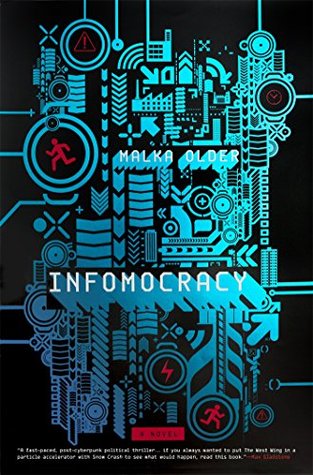More on this book
Community
Kindle Notes & Highlights
All this surrounded by a checkerboard of populist and regionalist governments in the provinces, few of them with any centenals outside the southern cone.
Every centenal, every collection of one hundred thousand neighbors, matters, whether it is spread over hundreds of miles in the tundra or crammed into a couple of overdeveloped blocks in Dhaka.
Twenty years ago, the people of the world came together in an unprecedented step to form a new international order. Since the first global election, war among participating jurisdictions has been eradicated, and prosperity and trade have spread.
She has her screen set up to automatically calculate and source the most popular feeds globally and locally, so that at any given moment, she knows what most people are learning. She includes the major news compilers, regardless of how many people are paying attention to them, broken down to the continent level and sometimes further. Besides that, her algorithm adds in a couple of random streams that flick between various compilers, opinionators, and virtual plazas without regard for size or relevance.
Opening the borders (such borders as remained, anyway) allowed the new governments to pull in more like-minded people, consolidating their holds on their centenals for the next election and stretching into neighboring ones as populations surged. Some journalist two decades ago dubbed the process mandergerrying, although it is also known as reverse osmosis, because it results in greater concentrations of like-minded—and, on occasion, racially or ethnically alike—constituents.
why should people have to move halfway across the world—well, okay, a quarter or so in my grandparents’ cases, perhaps more in yours—to have a decent government?
you can give a voter Information, but you can’t make him think.”
She has sometimes wondered if this is why people hate Information; whether the idea of all those people working for an enormous bureaucracy, supposedly sapped of their individual identities, spurs some primal fear in people. Or guilt that unimaginable masses of workers have to sort through vids and grind out commentary nonstop to provide the extraordinarily individualized Information that almost everyone on Earth now feels entitled to.
“When you watch TV, do you ever feel guilty about wasting your life?”
The new Heritage coalition of wealthy, experienced global corporates ignored the accessibility of Information, produced their standard glossy misinformation, and not only took the Supermajority but won centenals where, analysts agreed, it was demonstrably not in the interests of the people living there to vote for them.
There was a study done with minimally educated voters who, given a hypothetical ballot, picked the names of famous serial killers over randomly generated names as well as over those of actual, less well-known politicians.
on the theory that people listen for entertainment value and vote out of self-interest, but Mishima has been with Information long enough to be cynical: most people’s interest is entertainment.
we forget the physical weight of all the things we’ve built up around us.
Public transportation, which normally works by compiling all requests and calibrating the optimal route,
Meanwhile, is anyone raising money for … I don’t know, the two million people in Central Asia who will die of starvation or exposure this winter? The millions of homeless kids in centenals all over the world? The children and women being trafficked across continents? No. The world ignores those problems. Governments don’t want to talk about it, and the international community can hide behind these shitty elections as though so-called micro-democracy makes everything okay.”
Most of the population of the formerly United States continues to vote in automatic swathes of Democrat or Republican, and every election season produces some variation of a political cartoon in which blinkered Statesers examine a narrow choice of governments while congratulating themselves on their democratic traditions.
Her narrative disorder is the background palette, a bright but 85 percent transparent pink faintly patterned with lightning bolts, ninjas, flowers, sailing ships, smoking guns, and horses.
Yes, they are right on principle, but democracy is of limited usefulness when there are no good choices, or when the good choices become bad as soon as you’ve chosen them, or when all the Information access in the world can’t make people use it.
But then, those may be exactly the people who pose the greatest threat to the system: the people who can still remember, with rancor and longing and the inevitable distortions of time, what things were like before.
despite all the Information available, people tend to look at what they want to see.


